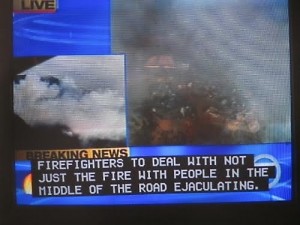
American Sign language during disaster for deaf and dumb
We publish a simple dictionary-video for people which have to talk with deaf and dumb during an emergency. As you know catastrophe can strike at any time, anywhere. Imagine learning there was a major disaster near your home, but not having any reliable information about it. Imagine the fear and panic caused by a flood, hurricane, or wildfire. If you couldn’t communicate with anyone, would you know what to do? If your hard of hearing parent were in the disaster zone, would anyone help them?
In 2003, a Russian boarding school for deaf students caught fire in the middle of the night. In the old building, there were no flashing alarm lights or vibrating beds to awaken the students. There were no emergency precautions in place at all. Instead, 28 young boys lost their lives to the blaze, while teachers frantically ran room to room, desperately pulling children from their beds.
 The severe lack of centralized emergency management provisions for the Deaf is alarming, and definitely unequal. While the hearing population gets bombarded with crisis updates across multiple media, to the point of redundancy; deaf citizens are left confused, trying to follow news reports without closed captioning or digging for info on the web. Deaf individuals are more likely to miss early warnings because they aren’t listening to the radio or television. Keeping up with real-time developments is difficult when you cannot just flip on the news, and relying on secondhand information from hearing citizens is hardly sufficient. Following emergency situations, many deaf survivors report that they did not fully understand what occurred until a few days or even weeks later.
The severe lack of centralized emergency management provisions for the Deaf is alarming, and definitely unequal. While the hearing population gets bombarded with crisis updates across multiple media, to the point of redundancy; deaf citizens are left confused, trying to follow news reports without closed captioning or digging for info on the web. Deaf individuals are more likely to miss early warnings because they aren’t listening to the radio or television. Keeping up with real-time developments is difficult when you cannot just flip on the news, and relying on secondhand information from hearing citizens is hardly sufficient. Following emergency situations, many deaf survivors report that they did not fully understand what occurred until a few days or even weeks later.
During the Hurricane Sandy press conferences, I had to firmly advocate for visibility on screen. What Mayor Bloomberg had to say was critical for New Yorkers to know, and it was my job to make sure that message was delivered to the deaf community. In the middle of a crisis, ASL interpreters cannot do our jobs from the sidelines! We should not have to insist on the importance of our role, and it is uncomfortable to defend yourself at a time when people may be in danger. Interpreters serve the community best when they are front and center. I have heard numerous reports of interpreters being present during press conferences, but being left out of the shot on air. How on Earth can an interpreter deliver a message to the deaf if he or she cannot be seen on TV?


